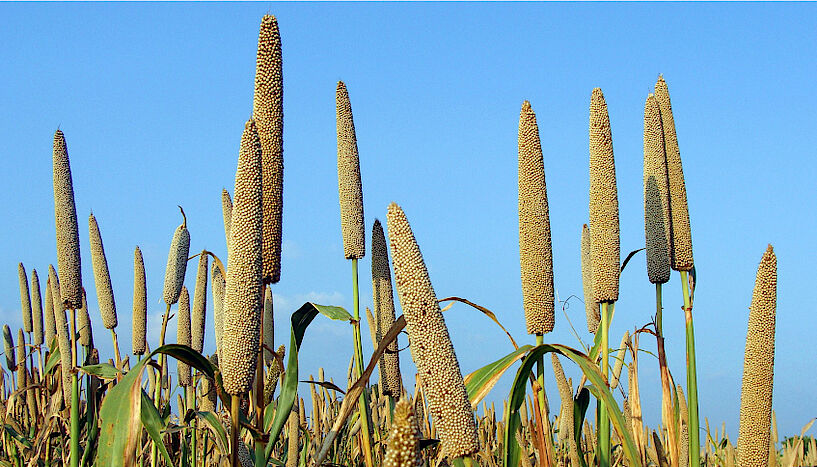Cereal crops fighting the climate chaos
Pearl millet defies drought
Agriculture and climate experts have warned for some years that extreme climate events including severe droughts with frequent heatwaves drop the production of major staple food crops like wheat causing a severe threat to food security. Therefore, scientists are looking at grains that can better adapt to these circumstances: An international team, lead by Wolfram Weckwerth from the University of Vienna, has taken a comparative physiological and molecular view on wheat and pearl millet under drought stress, explaining how pearl millet can stand out in this looming climate change chaos better than wheat. The study has been published in “Plant Science”.
“Pearl millet is an essential cereal crop containing same or even better nutrients as wheat with higher amounts of Zinc and Iron.” says Wolfram Weckwerth from the Department of Functional and Evolutionary Ecology at the University of Vienna and leader of the study.
In his lab for Molecular Systems Biology (MOSYS) and the Vienna Metabolomics Center (VIME) at the University of Vienna he took a close look at the crops superior resilience to drought and heat stress, together with an international team from the University of Oviedo (Spain), the National Institute of Biology, Ljubljana (Slovenia), IROST Tehran (Iran) and CEGSB team ICRISAT (India).
“However, it is an under-utilized crop, despite it’s remarkable characteristics.” he adds.
When it comes to resilience to climate stressors, water resources are the critical parameter, but also heat, especially under long drought periods. Furthermore, an increase of biodiversity in agriculture would enhance the resilience of agricultural processes to these dramatic climate changes.
“Pearl millet is such a well-deserved alternative which can provide nutrition without the requirement of too much water and a much higher resistance to heat and drought compared to wheat, rice and maize. Research programs and political efforts are necessary to making these underutilized crops available compared to a focus on only three to four major staple food crops in the world, in order to ensure food security.” says Weckwerth.
Pearl millet as smart crop
“Almost 40% of our daily calories are dependent on three cereals (wheat, rice and maize) which requires more resources than pearl millet.” explaines Palak Chaturvedi, co-leader of the study. “It is the time to see for a climate smart crop, and pearl millet has full capacity and nutritional property to be termed as smart crop.”
In this study, he and the team have elucidated processes of resilience of pearl millet to drought stress. This information can be used in breeding more and more drought-tolerant lines in both pearl millet and wheat.
Furthermore, the paper provides of a comparative view on C3 and C4 photosynthetic proteins, wax biosynthetic proteins, and stay green and senescence proteins that are essential to survive harsh climatic conditions.
Arindam Ghatak, first author of the study, highlightes the importance of the other molecular analysis in the flow of central dogma (i.e. RNA, proteins, and metabolites) and their correlation with the physiological trait. He explaines that genome-based assisted breeding is only capable of covering 30-40 % of phenotypic variance according to the most recent GWAS studies. “There are many processes which are not predictable by genome information, especially protein translation and activity, which is crucial for phenotypic responses and survival of the plants under severe stresses”.
Publication in “Plant Science”:
Ghatak A, Chaturvedi P, Bachmann G, Valledor L, Ramšak Ž, Bazargani MM, Bajaj P, Jegadeesan S, Li W, Sun X, Gruden K, Varshney RK and Weckwerth W (2021) Physiological and Proteomic Signatures Reveal Mechanisms of Superior Drought Resilience in Pearl Millet Compared to Wheat. Front. Plant Sci. 11:600278. DOI: 10.3389/fpls.2020.600278

